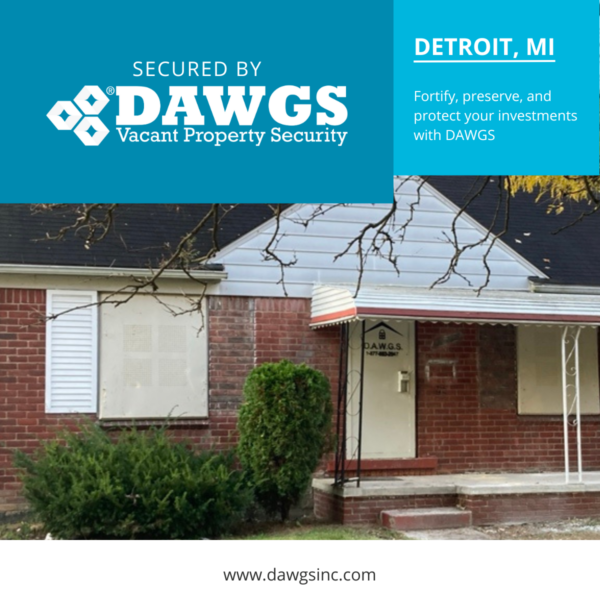Securing a Detroit vacant property comes with a unique set of challenges, from the threat of vandalism to potential safety hazards. To protect your investment and contribute to community well-being, implementing effective security measures is paramount. In this blog post, we’ll explore the best practices for vacant property owners to ensure the safety and preservation of their assets.

DAWGS door and window guards securing vacant properties in Detroit
1. Perform Regular Inspections
Regular inspections are the first line of defense against potential issues. Securing a Detroit vacant property starts with scheduled routine checks to identify vulnerabilities and address them promptly.
2. Install Robust Entry Point Security
Strengthen doors, windows, and other entry points. Consider installing security doors, reinforced windows, and deadbolt locks to deter unauthorized access.
3. Utilize Visible Signage
Clearly display warning signs such as “No Trespassing” to discourage trespassers and communicate that the property is actively monitored.
4. Invest in Quality Lighting
A well-lit property is a deterrent to criminal activities. Install motion-activated lights to cover dark areas and enhance visibility during the night.
5. Implement Video Surveillance
Install a reliable video surveillance system to monitor the property. Visible cameras act as a deterrent, while recorded footage can provide crucial evidence in case of an incident.
6. Secure the Perimeter
Fencing the property establishes a clear boundary and adds an extra layer of security. Choose a sturdy fence to discourage trespassers.
7. Hire Professional Security Services
Engage professional security guards or services to provide a physical presence on-site, deterring potential intruders and responding swiftly to threats is key for vacant property security in Detroit.
8. Utilize Remote Monitoring Technology
Incorporate remote monitoring systems that allow you to keep tabs on the property in real-time, even from a distance. This can provide peace of mind and quick response capabilities.
9. Maintain Landscaping
Regular landscaping not only improves the property’s appearance but also prevents the appearance of neglect, which can attract unwanted attention.
10. Implement Fire Prevention Measures
Reduce the risk of fires by removing combustible materials and implementing fire prevention strategies. This includes ensuring that electrical systems are properly maintained.
11. Remove Valuables from the Property
If possible, remove valuable items from the property to eliminate the incentive for theft. This includes appliances, copper wiring, and any other items of value.
12. Board Up Windows and Doors
Boarding up windows and doors not only deters break-ins but also protects the property from weather damage. The classics also apply for vacant property security in Detroit.
13. Collaborate with Local Law Enforcement
Build a positive relationship with local law enforcement. Keep them informed about the property’s vacant status and seek their advice on additional security measures.
14. Community Engagement
Inform neighbors about the property’s status and encourage them to report any suspicious activities promptly. A vigilant community is an additional layer of security.
15. Adhere to Local Regulations
Stay informed about local ordinances and regulations pertaining to vacant property security in Detroit. Adhering to these guidelines ensures legal compliance and avoids potential fines.
16. Document Security Measures
Maintain detailed records of all security measures implemented, including installation dates and maintenance schedules. This documentation can be valuable for reference and accountability.
Securing a Detroit vacant property is not only about protecting your investment but also about fostering a sense of responsibility within the community. By following these best practices, vacant property owners can minimize risks, deter potential threats, and contribute to the overall safety and well-being of the neighborhood.



